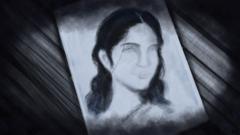In the 1920s, when women's roles in cinema were restricted, a young woman ventured to change the narrative. PK Rosy made history as the first female lead in Malayalam cinema with the film "Vigathakumaran," or "The Lost Child." However, instead of being celebrated, her story was obscured by caste oppression and social upheaval. Coming from a lower-caste Pulaya community in Kerala, Rosy faced severe backlash for playing an upper-caste character. Almost a century later, her achievements remain largely unknown, with the film's reel lost to time and no verified images of her surviving.
Born Rajamma in the early 1900s, Rosy began her journey in the entertainment industry with the support of her uncle, a theater artist. Despite societal stigma against Dalit women, she gained fame in local theater, eventually catching the attention of director JC Daniel. Cast as Sarojini, Rosy earned a significant salary for her time, but soon after facing an angry mob on her film's premiere night, her life was turned upside down. She and her family were barred from attending due to their caste.
Violence erupted as the crowd reacted to the film's portrayal of a Dalit woman with an upper-caste love interest. Following threats and attacks, including her home being set ablaze, Rosy was forced to flee and sever ties with her past. She later married an upper-caste man, adopting his name, and lived her remaining years in obscurity in Tamil Nadu, forever hiding her connection to her lost identity in the film industry.
Decades later, attempts to resurrect Rosy’s legacy are underway, driven by Dalit filmmakers and activists. Annual film festivals and organizations inspired by her story seek to honor her contributions to cinema. However, her legacy still echoes the deep-seated pain of caste-based trauma, a reminder of the sacrifices made for survival over art and identity. "It's not her failure—it's society's," reflects her nephew.




















